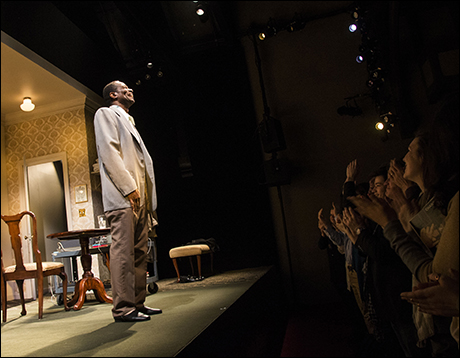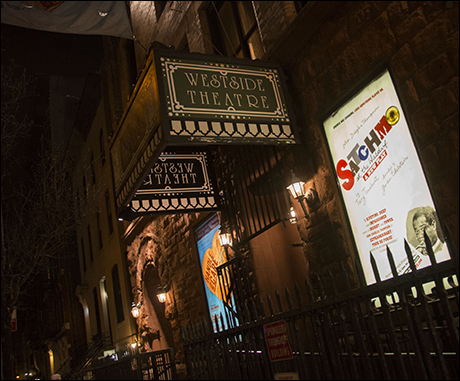“Vivacity, leadership, must be had, and we are not allowed to be nice in choosing. We must fetch the pump with dirty water, if clean cannot be had.”
Ralph Waldo Emerson, “Power”
Still cooking
 Satchmo at the Waldorf continues to run off Broadway at the Westside Theatre. John Douglas Thompson’s performance–incredibly–grows deeper and deeper. If you haven’t seen it, do, and if you have, tell your friends (or see it again!).
Satchmo at the Waldorf continues to run off Broadway at the Westside Theatre. John Douglas Thompson’s performance–incredibly–grows deeper and deeper. If you haven’t seen it, do, and if you have, tell your friends (or see it again!).
I have a compliment to report: a playwright of note who came to last Tuesday’s opening-night performance told me afterward that he thought I’d created “a remarkable cubist portrait” of Louis Armstrong. That’s actually a very subtle way of describing the play’s multiple perspectives on Armstrong and his career.
Some other pieces of news:
• The New Yorker caught up with us over the weekend, and the results were highly gratifying:
The last strains of the set die out, the door to the dressing room opens, and in walks Louis Armstrong (John Douglas Thompson), carrying his trumpet and making his way, stiffly but urgently, to the oxygen tank next to the sofa. It’s 1971, and the giant of twentieth-century American music is in a reflective mood….Teachout, Thompson, and the director, Gordon Edelstein, together create an extraordinarily rich and complex characterization. The show centers on the trumpeter’s relationship with his Mob-connected Jewish manager of more than thirty-five years, Joe Glaser. Thompson forcefully inhabits both men–and throws in a chilling Miles Davis–delivering an altogether riveting performance.
Read the whole thing here.
• I rejoice to announce that the script of Satchmo at the Waldorf will be published by Dramatists Play Service, Inc., whose other authors include Edward Albee, Christopher Durang, Horton Foote, Brian Friel, Athol Fugard, John Guare, A.R. Gurney, Amy Herzog, David Ives, Warren Leight, Tracy Letts, David Mamet, Martin McDonagh, Conor McPherson, Lynn Nottage, and John Patrick Shanley. I am honored beyond words to join their ranks.
 The announcement is here.
The announcement is here.
• John and I took last Thursday afternoon off and drove out to Newark to to do an hour-long interview about Satchmo at the Waldorf on WBGO, the New York area’s top jazz radio station. Not only did we talk at length about the show and how it came to be, but Rhonda Hamilton, the host, also played several of our favorite Armstrong records in the course of the broadcast.
Not at all surprisingly, we had a lot of fun, and you can listen to us having it by going here.
• Finally, the TV ad for Satchmo rolled out late last week. Here it is. I’m biased, of course, but I think it’s way cool:
Just because: Wes Montgomery plays Horace Silver
Wes Montgomery rehearses and plays Horace Silver’s “Nica’s Dream” in 1965:
(This is the latest in a series of arts-related videos that appear in this space each Monday and Wednesday.)
Almanac: Eric Hoffer on political leaders
“The leader personifies the certitude of the creed and the defiance and grandeur of power. He articulates and justifies the resentment dammed up in the souls of the frustrated. He kindles the vision of a breath-taking future so as to justify the sacrifice of a transitory present. He stages a world of make-believe so indispensable for the realization of self-sacrifice and united action.”
Eric Hoffer, The True Believer: Thoughts on the Nature of Mass Movements
Just the facts, ma’am (and plenty of them)
In today’s Wall Street Journal I review two new plays, Robert Schenkkan’s All the Way (in which Bryan Cranston plays Lyndon Johnson) and Sarah Ruhl’s Stage Kiss. Here’s an excerpt.
* * *
Robert Schenkkan’s “All the Way” is not LBJ’s first stage appearance, but it’s the first time that he’s made it all the way to Broadway, and the presence of Bryan Cranston in the cast is the sole reason for his arrival there. New plays don’t reach Broadway nowadays without a movie or TV star, and Mr. Cranston, lately of “Breaking Bad,” is (at least for the moment) the latter. Far more important, he’s also a totally assured stage performer who plays Johnson as a gangly, lapel-snatching wheedler in whom self-pity and rage are twisted together too tightly to rip apart. Yes, it’s a caricature, and a garish one at that, but Mr. Cranston makes you believe in what you’re seeing and hearing.
 Not so his hard-working colleagues, most of whom struggle with Mr. Schenkkan’s overstuffed pageant-style recounting of how Johnson got the Civil Rights Act of 1964 passed, in which historical events whiz by like floats passing in review and LBJ is the only character who seems at all lifelike. Everybody else talks as if he’s onstage, and every speech is so freighted with factual exposition that it’s impossible for the supporting players to take wing…
Not so his hard-working colleagues, most of whom struggle with Mr. Schenkkan’s overstuffed pageant-style recounting of how Johnson got the Civil Rights Act of 1964 passed, in which historical events whiz by like floats passing in review and LBJ is the only character who seems at all lifelike. Everybody else talks as if he’s onstage, and every speech is so freighted with factual exposition that it’s impossible for the supporting players to take wing…
Sarah Ruhl is the stickiest of sentimentalists, but nobody has to tell her that it isn’t hip, so she caps her carious sweet tooth with a thick coat of Irony Lite. Result: box-office success. Witness “Stage Kiss,” a two-hour exercise in theatrical inside baseball (“I just got the sides because my agent blah blah blah”) whose principal characters, identified in the program as “She” (Jessica Hecht) and “He” (Dominic Fumusa), are a pair of actors who used to be a couple, parted on bad terms and are now appearing together in a play that requires them to share a big, juicy kiss. Oh, yes, “She” has since acquired a husband (Daniel Jenkins) and a daughter (Clea Alsip). Making due allowance for the usual postmodern pseudo-twists, everything that happens thereafter is horrifically predictable…
* * *
Read the whole thing here.
A TV commercial for All the Way:
President Johnson talks to Sen. Richard Russell by phone on Nov. 28, 1963, six days after the assassination of John Kennedy. This call was secretly recorded by Johnson:
Almanac: Picasso on work
“Work is a necessity for man. Man invented the alarm-clock.”
Pablo Picasso (quoted by Janet Flanner in The New Yorker, Dec. 9, 1939)
MEMOIR
Louis Kaufman, A Fiddler’s Tale: How Hollywood and Vivaldi Discovered Me. The utterly charming autobiography of the Hollywood-based violinist who played on the soundtracks of Gone With the Wind and Psycho, made the very first recording of Vivaldi’s Four Seasons, performed with Aaron Copland, Darius Milhaud, and Francis Poulenc, bought the first oil painting ever sold by Milton Avery, and was by all accounts one of the nicest people who ever lived. His story is as fascinating as it is improbable–but every word is true (TT).
PLAY
London Wall (Mint Theater, 311 W. 43, extended through Apr. 26). The U.S. premiere of John Van Druten’s 1931 comedy about a quartet of working women and the benighted men for whom they work. It has a distinctly contemporary flavor–enough so that you’ll come away wondering whether Van Druten might deserve credit for inventing the workplace comedy long before it found favor on TV–and this immaculate revival is involvingly performed by one of New York’s top off-Broadway troupes (TT).
